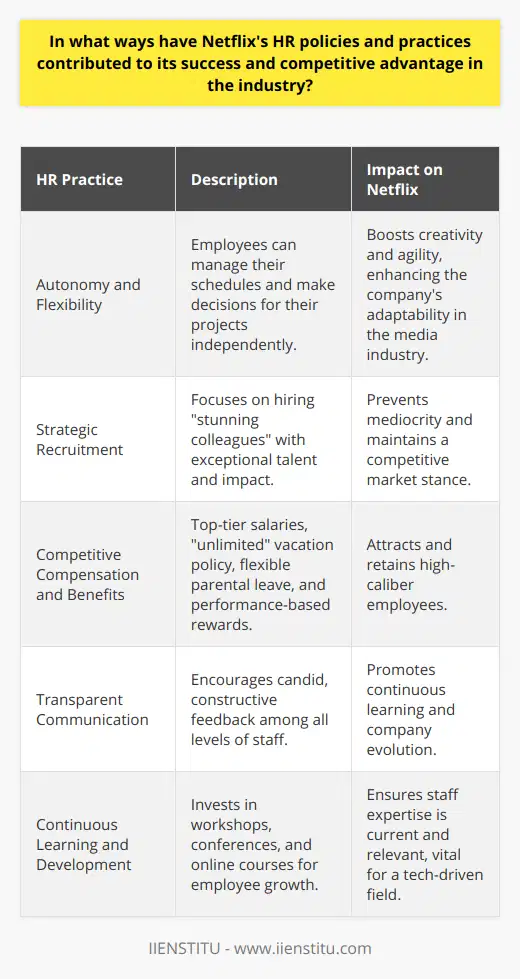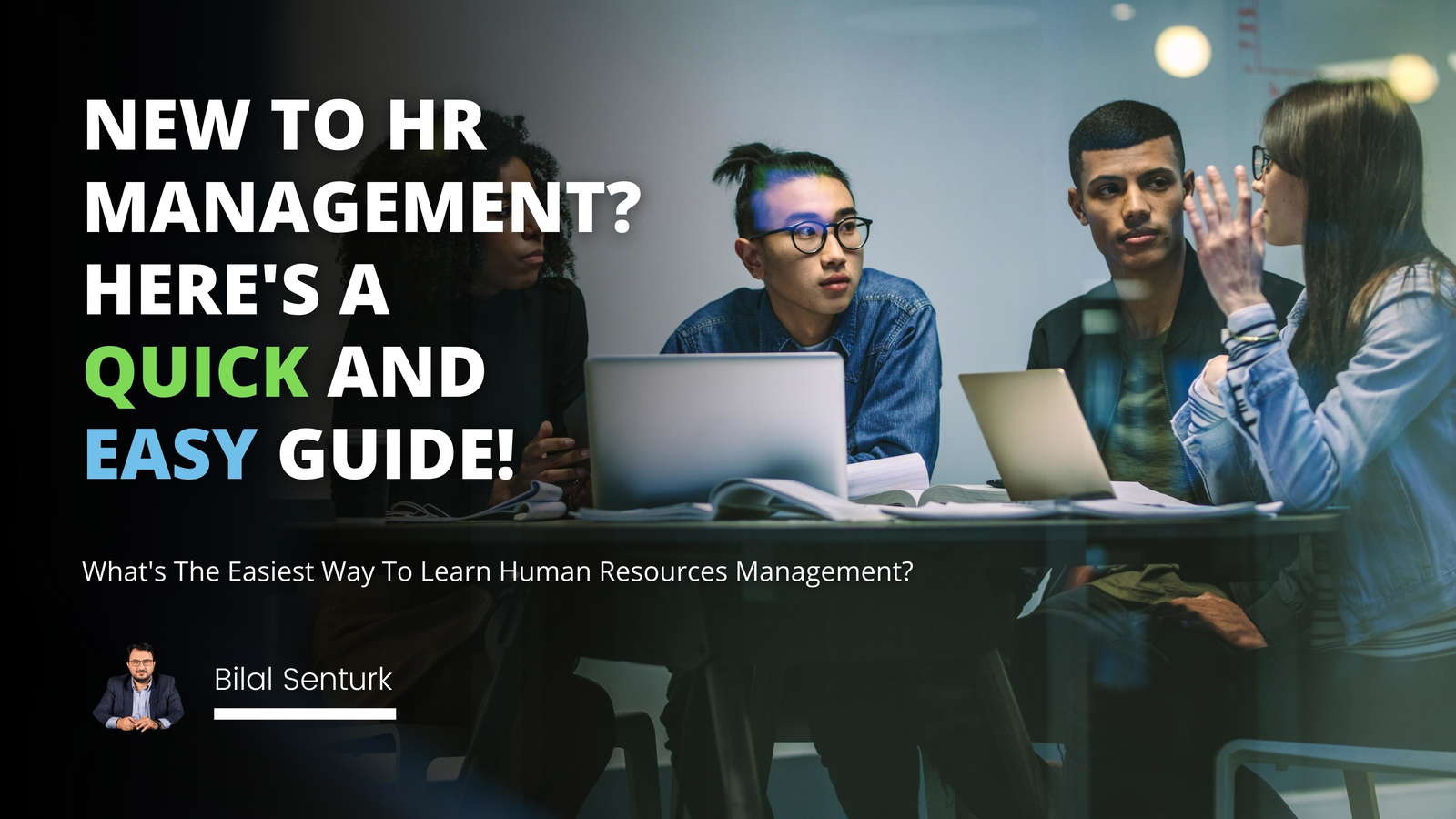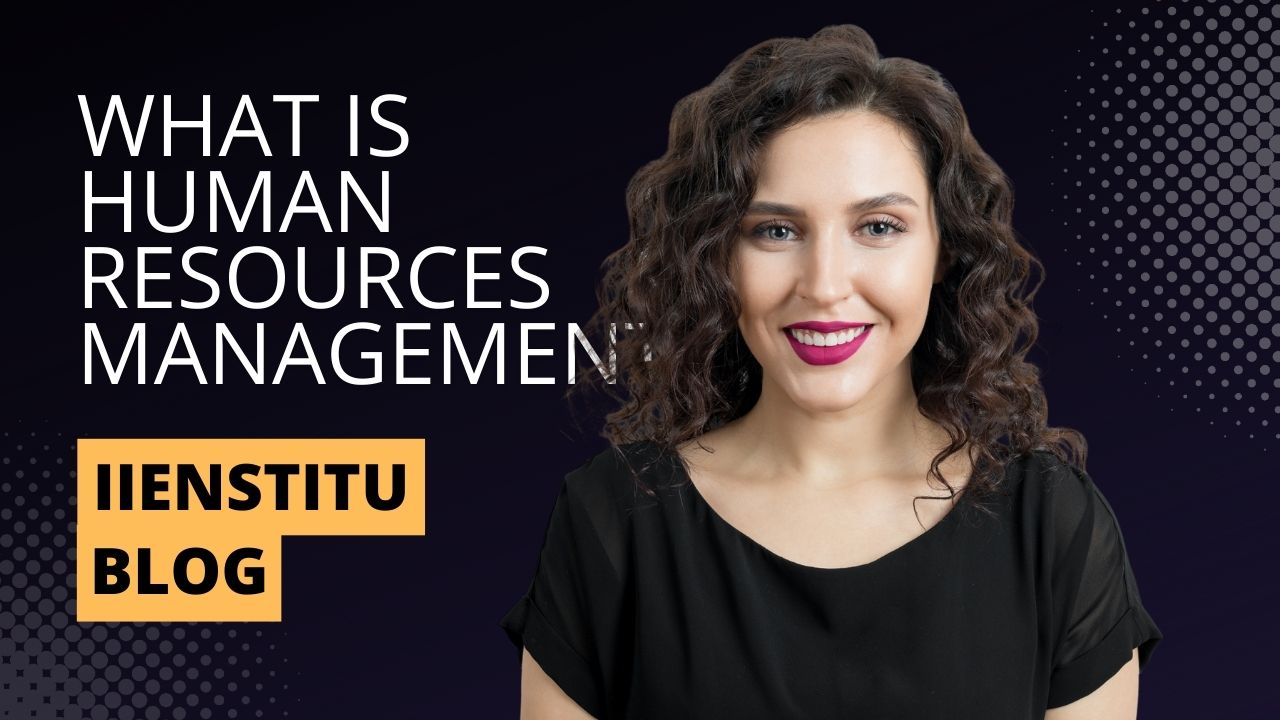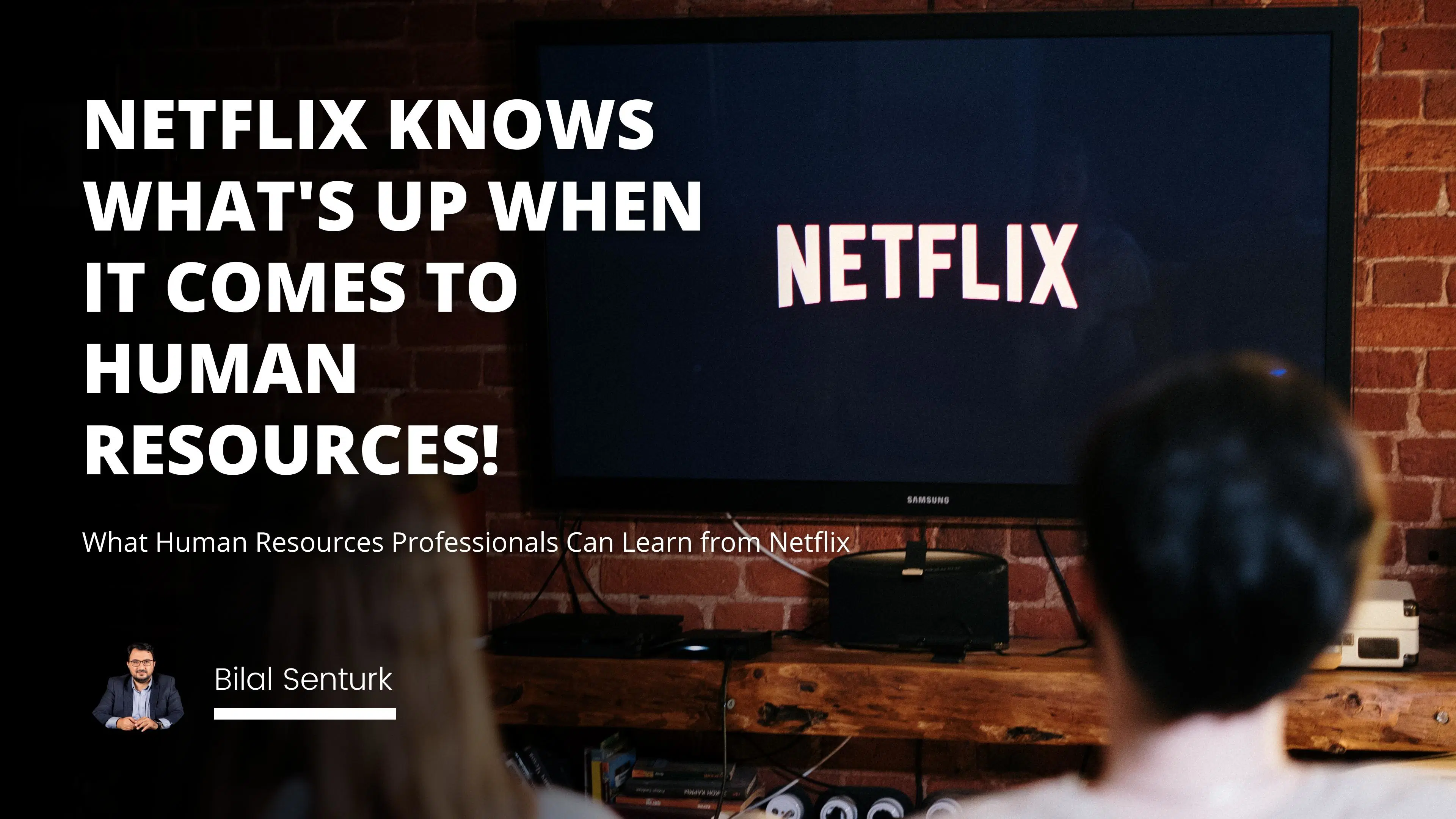
Netflix is a juggernaut when it comes to both content and HR. The company has consistently been on the forefront of innovation, whether it’s original content creation or Employer Branding. From a human resources perspective, there are a few key areas where Netflix really excels. Here are three things that HR pros can learn from the streaming giant.
1. The Importance of Data-Driven Decision Making
Netflix has always been a data-driven company. In fact, they were one of the first companies to really embrace big data and use it to their advantage. This data-driven approach extends to their HR decisions as well. They use data to inform their hiring decisions, to assess employee performance, and to identify areas for improvement.
2. The Power of Employee Development
Netflix knows that employees are their most valuable asset. They invest heavily in employee development and growth. They offer employees generous amounts of paid time off to encourage them to take courses and attend conferences. They also have an internal learning management system where employees can access training materials on a wide variety of topics.
3. The Importance of Company Culture
Company culture is extremely important to Netflix. They make sure that every new hire is a good fit for their culture and values. They also go above and beyond to make sure that their employees are happy and engaged. For example, they offer unlimited vacation days and flexible working hours. All of these factors contribute to a positive company culture that helps them attract and retain top talent.
4. The Value of Transparency
Netflix is incredibly transparent with its employees. They share their company goals and metrics openly, they openly talk about their successes and failures, and they candidly discuss their business strategies. This transparency fosters trust between management and employees and also encourages employees to take ownership of their work. All of these factors help Netflix create a forward-thinking, innovative culture.
5. The Importance of Communication
Communication is another key area where Netflix stands out. They regularly hold all-hands meetings with their employees, they have an open door policy when it comes to communication, and they encourage feedback and collaboration. By creating a culture of communication, they ensure that everyone feels heard and engaged in company decisions. This helps them continue to be a top employer of choice in a highly competitive industry.
6. The Importance of Flexibility
Netflix understands the importance of flexibility when it comes to both employee needs and company goals. They offer a wide range of flexible work arrangements, allowing employees to create a schedule that works for them. This type of flexibility can help companies reduce turnover rates and improve productivity. At the same time, it also supports work-life balance and helps employees feel valued and engaged in their jobs.
7. The Value of Innovation
Recognizing that innovation is key to success in today's business climate, Netflix has made a commitment to continue innovating and moving the company forward. They are constantly looking for new ways to use technology and data to improve their products and services. They also work hard to cultivate an innovative culture among their employees, encouraging creativity and risk-taking. By doing so, they set themselves up for continued growth and success in the years ahead.
8. The Role of Continuous Improvement
At Netflix, continuous improvement is seen as a key driver of success. Whether it's improving their products and services or enhancing their company culture, they are always striving to do better. This commitment to continuous learning and improvement can be seen in everything from their approach to hiring and training to the way they measure employee performance. Ultimately, this focus on continual growth has helped make Netflix one of the top companies in its industry today.
9. The Importance of Employee Engagement
Finally, at Netflix, employee engagement is a top priority. They go out of their way to create engaging work environments and motivating career opportunities for their employees. This includes providing them with ample training and development opportunities, as well as giving them the freedom to be creative and think outside the box. By focusing on employee engagement in this way, Netflix has been able to build a highly talented and motivated workforce that is consistently driving innovation within the company.
Netflix is a great example of a company that is constantly innovating, both in terms of content and HR. There are a few key lessons that HR pros can learn from Netflix, including the importance of data-driven decision making, the power of employee development, and the importance of company culture. Implementing even just one of these lessons can help your company improve its HR Function and better support your employees.
Regardless of where you are in your HR career, there is always room for improvement. If you want to take your skills to the next level, our HR management training course is perfect for you. You will learn from experienced professionals and gain valuable insights that you can apply in your own workplace. So what are you waiting for? Join our HR management course today!
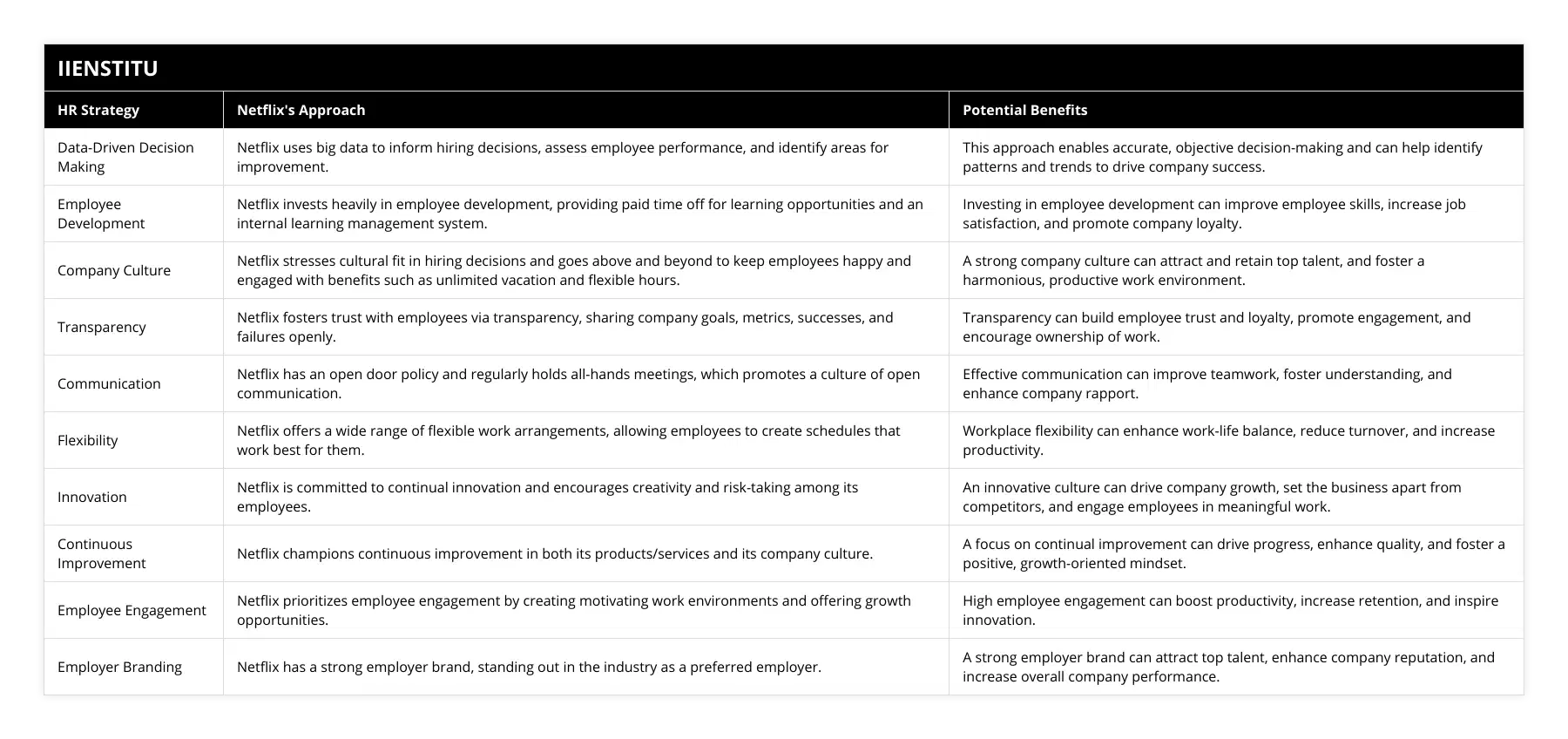
Frequently Asked Questions
What are some of the things that Netflix does to make their company a great place to work?
Some of the things that Netflix does to make their company a great place to work include:
Offering a generous parental leave policy
Providing unlimited vacation time for employees
Encouraging employees to take time off during the work day for relaxation and rejuvenation
Offering a variety of workplace perks, such as free meals, flexible work hours, and on-site childcare
Netflix also places a strong emphasis on employee satisfaction and happiness. The company regularly conducts surveys to assess employee satisfaction levels and takes action when necessary to improve the workplace environment.
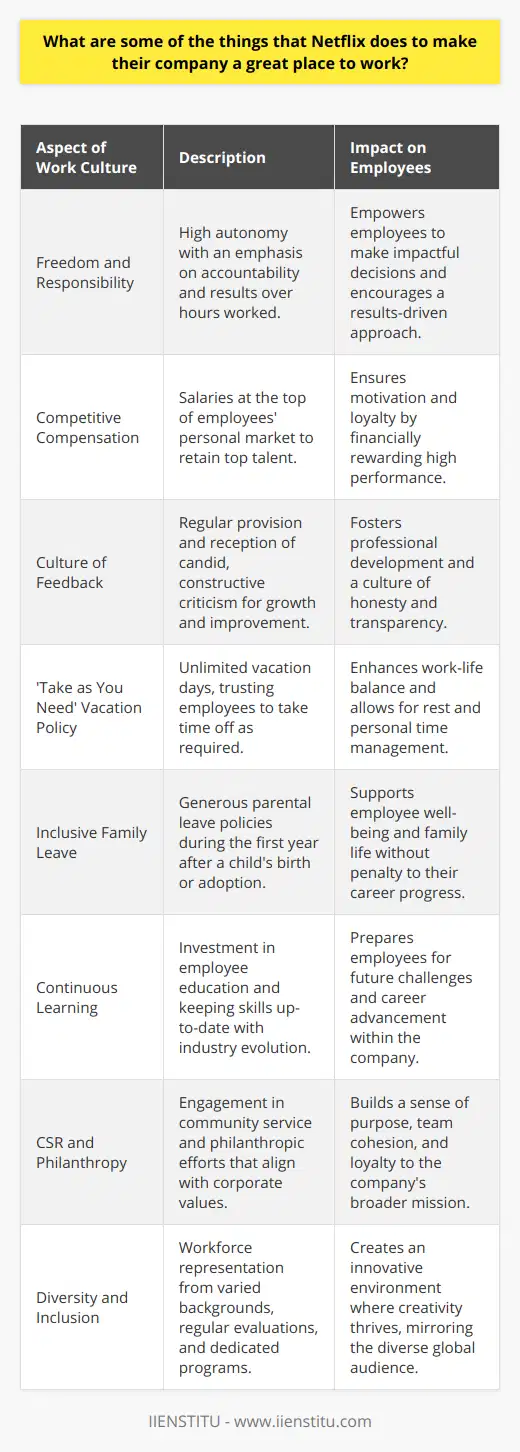
What do you think are the benefits of having a great company culture?
A great company culture has a lot of benefits, including:
Attracting and retaining top talent
Having a more engaged workforce
Being able to move faster and make better decisions
Building a sense of community and belonging for employees
Creating a positive brand image for the company
Netflix has stated that they put a lot of focus on their employees’ development. What do you think HR professionals can learn from this?
Netflix does put a lot of focus on its employees' development. In fact, the company has even developed its own in-house training program called "Netflix University."
The program is designed to help Netflix employees learn about the company's culture and how to be effective managers. It also offers courses on specific skills like data analysis and product development.
Netflix's focus on employee development is one of the reasons the company has been so successful. By investing in its employees, Netflix ensures that it will continue to have a team of talented and motivated workers who are capable of meeting the challenges of the ever-changing streaming industry.
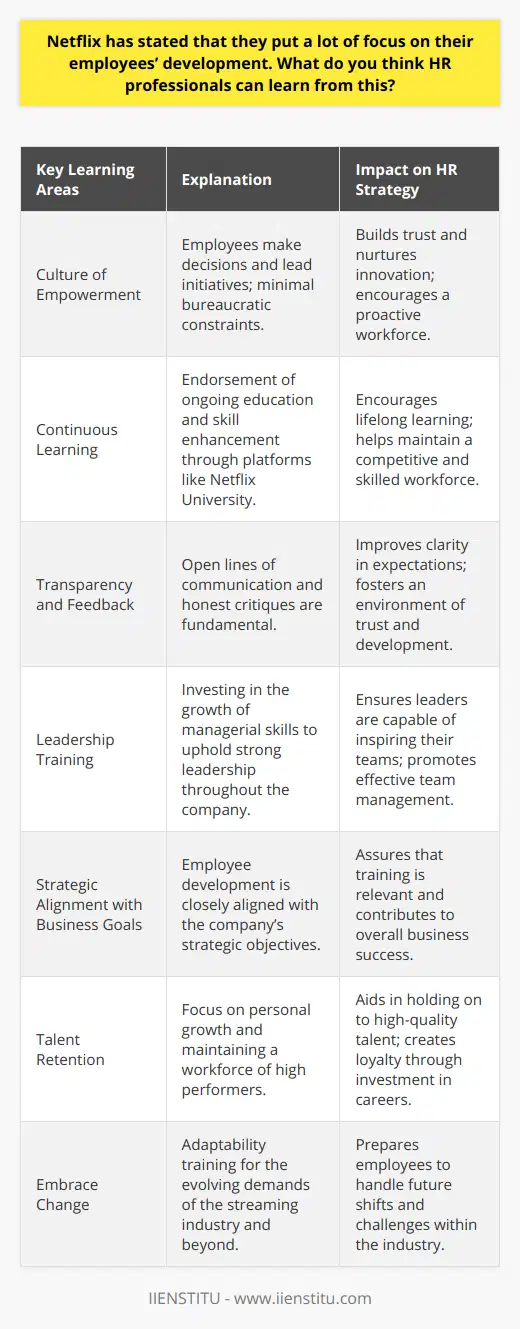
How does Netflix use intrinsic motivation to support HR practices?
Intrinsic Motivation in HR Practices
Netflix utilizes intrinsic motivation in its human resources (HR) practices, fostering an environment that encourages employees to derive satisfaction from their work. The company achieves this through several methods: trust, openness, and a focus on personal development.
Trust and Autonomy
A key aspect of Netflix's HR strategy is the establishment of trust and autonomy among employees by granting them independence and flexibility in their roles. This approach empowers workers to take ownership of their tasks, resulting in increased job satisfaction and motivation.
Openness and Transparency
Netflix fosters a culture of openness and transparency, where employees are encouraged to share ideas, opinions, and even criticisms without fear of retaliation. By creating an atmosphere of honest feedback, employees feel valued and engaged, leading to higher levels of motivation and commitment in their work.
Personal Growth and Development
Lastly, Netflix supports personal growth and development through continuous learning opportunities, such as training programs and mentorship. This commitment to helping employees expand their skills and knowledge enables them to remain motivated and invested in their roles while contributing meaningfully to the company's overall success.
In conclusion, Netflix successfully employs intrinsic motivation in its HR practices by cultivating a culture of trust, openness, and personal development. By addressing these key aspects, the company fosters an environment where employees feel motivated and empowered, leading to positive outcomes for both individuals and the organization as a whole.
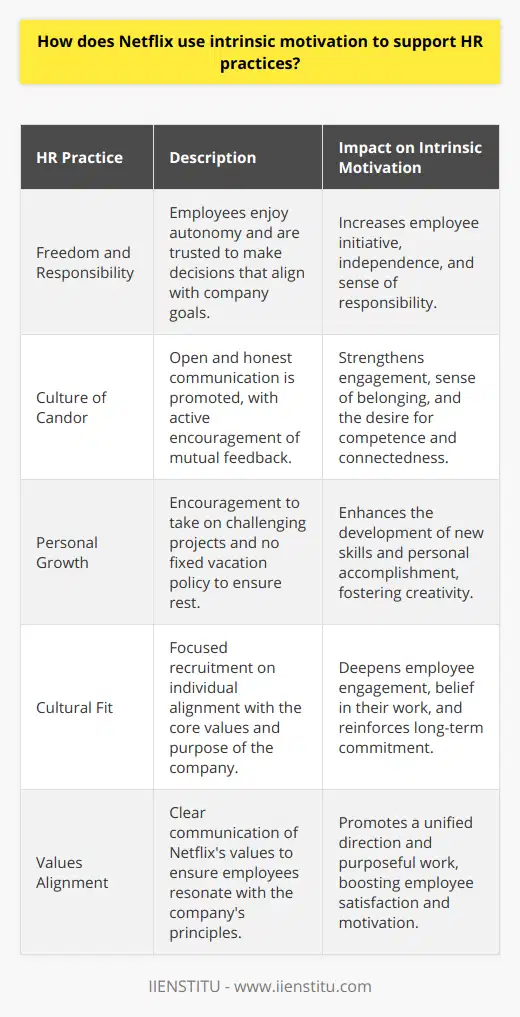
Why Netflix reinvented HR?
Redefining HR Practices
One of the key reasons behind Netflix's decision to reinvent HR was to address the changing needs of the modern workforce. Traditional HR policies have grown outdated and fail to emphasize flexibility and individualization, which are essential in creating an attractive work environment in today's competitive market. By adopting a more innovative HR approach, Netflix aims to attract the best talent, foster creativity and drive success in the long term.
Fostering a High-Performance Culture
Netflix's main objective in revamping HR is to create a culture of high performance. The company believes that by offering an environment where employees are empowered to take responsibility for their actions, continually learn and grow, and maintain open communication, they can better contribute to overall success. Consequently, Netflix has implemented policies such as the 'Keeper Test,' where managers regularly evaluate if their team members are indispensable, and unlimited vacation days to encourage employee responsibility.
Streamlining Decision-Making Processes
Another reason Netflix reinvented HR is to streamline and decentralize decision-making processes within the organization. Traditional organizations often struggle with bureaucratic processes, which can stifle innovation and slow down progress. Netflix aims to alleviate this issue by promoting autonomy for employees, providing them the opportunity to make informed decisions without excessive oversight.
Emphasizing Employee Development
Furthermore, Netflix focuses on employee development to enhance the competencies and expertise of its workforce. Traditional HR models tend to rely on rigid training and development structures that may not account for a diverse range of employee needs. By adopting a more flexible approach, Netflix ensures that employees possess the necessary skills and knowledge to succeed while taking ownership of their own development.
Promoting Transparency and Feedback
Lastly, Netflix reinvents HR by promoting transparency and open communication, which facilitates a culture that thrives on feedback. The company actively encourages its employees to question decisions, provide constructive criticism, and share their ideas in a frank manner. This openness leads to better decision-making and higher levels of trust, helping Netflix remain agile and responsive to the rapidly evolving business landscape.
In conclusion, Netflix's reinvention of HR is a strategic move designed to address the evolving needs of the contemporary workforce, promote high performance, streamline decision-making, foster employee development, and facilitate transparency and feedback. By adopting these innovative approaches, Netflix positions itself as a competitive industry leader, ultimately enhancing the overall success and growth of the organization.
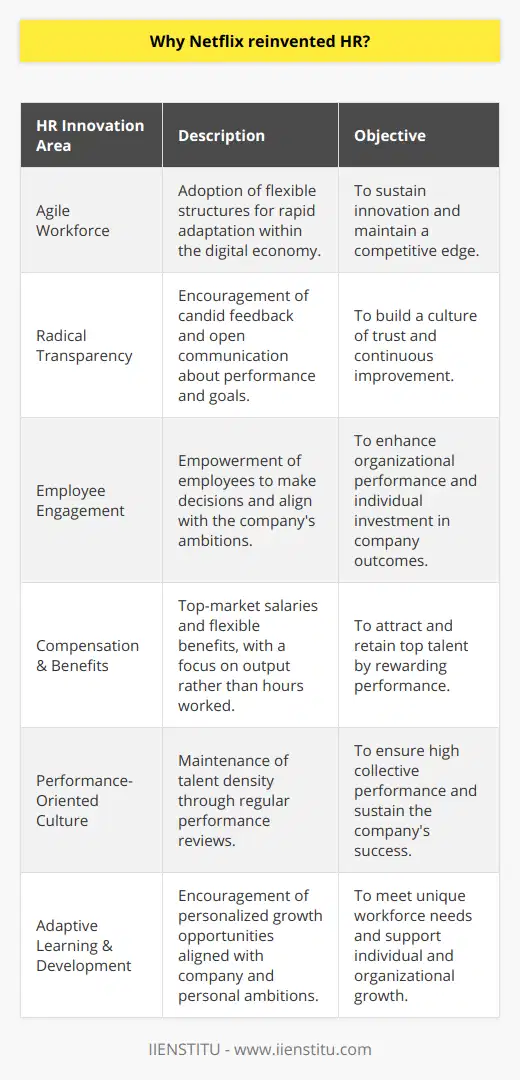
Does Netflix have a Human Resources department?
**Netflix's Human Resources Department**
Yes, Netflix has a Human Resources department. This department is responsible for aiding the organization in various aspects related to employee management and wellbeing. In the following sections, we will discuss the main functions and significance of this department in Netflix.
**Core Functions**
The primary purpose of Netflix's Human Resources department is to manage the company's personnel effectively. This includes talent acquisition, ensuring the right candidates are hired to contribute to the organization's growth and success. The department is also responsible for employee training and development programs to ensure that employees stay current with industry trends and acquire new skills.
**Employee Relations**
Another vital role that Netflix's Human Resources department plays is fostering positive employee relations. This includes addressing employee grievances and concerns, maintaining open communication channels, and resolving conflicts among team members. By facilitating a harmonious work environment, the department helps to promote employee satisfaction and retain top talent in the organization.
**Evaluations and Performance Management**
The Human Resources department at Netflix is responsible for evaluating employee performance and promoting career growth. They oversee performance assessment, goal-setting, and feedback processes, ensuring that employees receive constructive input to improve their performance. This process ultimately contributes to the overall success of the organization.
**Legal Compliance and Policies**
Netflix's Human Resources department is also tasked with ensuring that the company adheres to various labor laws and industry regulations. This includes developing and implementing policies for employee conduct, workplace safety, discrimination, and harassment, among others. By doing so, the department maintains a legally compliant work environment and mitigates potential risks to the organization.
**Employee Benefits and Compensation**
Lastly, the Human Resources department at Netflix manages employee compensation and benefits, striving to provide competitive packages that attract and retain top performers. This includes salary structures, bonus programs, health insurance, and other employee perks. Offering attractive benefits packages not only incentivizes employees to perform well but also contributes to the company's overall reputation as an employer of choice.
In conclusion, Netflix does have a Human Resources department that performs several critical functions in the organization. These functions include talent acquisition, employee relations, performance management, legal compliance, and benefits administration. By effectively managing these areas, the Human Resources department helps to create a positive work environment and ensure the organization's overall success.
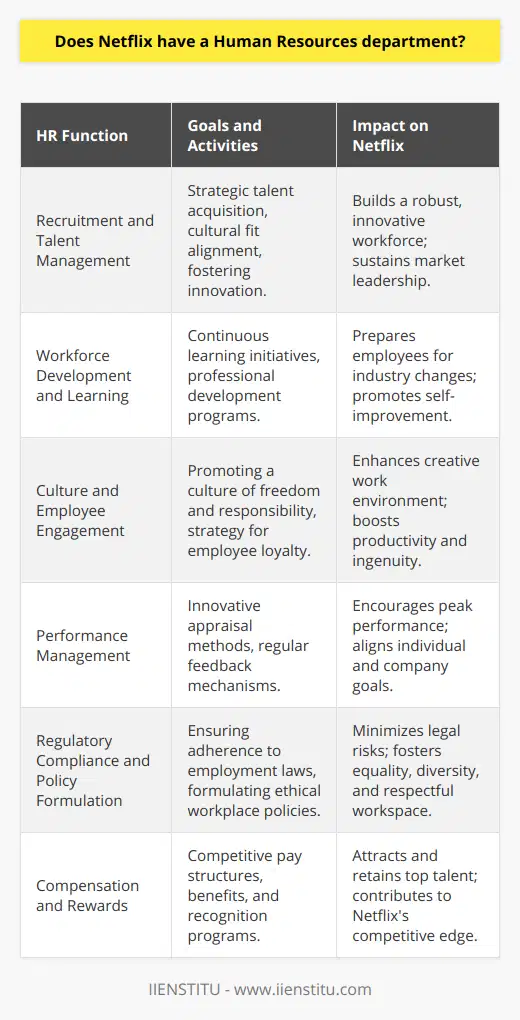
How does Netflix use Human Resources to maintain its innovative company culture?
Human Resources Strategies
Netflix has, over the years, been a leader in implementing innovative human resources (HR) strategies to foster and maintain a creative company culture. The streaming giant has adopted specific HR practices such as the Freedom and Responsibility culture, an attractive compensation system, and the no-vacation policy that encourages its employees to take control of their own work-life balance. All these factors ensure that the work environment at Netflix stays engaging and inspiring while retaining top talent.
Freedom and Responsibility Culture
The Freedom and Responsibility culture emphasizes giving employees complete autonomy in making work-related decisions. By empowering its workforce in this manner, Netflix encourages its employees to take ownership of their roles and contribute to the company's success in meaningful ways. Such a culture enables a higher level of innovation while holding employees responsible for meeting their objectives and benefiting the organization as a whole.
Attractive Compensation System
Netflix employs a transparent and market-based compensation system, offering above-market salaries to attract and retain top talent. This approach reflects the company's commitment to rewarding high-performing employees and keeping them motivated to innovate. By offering competitive remuneration packages, Netflix spurs its workforce to continuously push the boundaries of their creativity and contribute to the business's growth.
No Vacation Policy
Netflix's introduction of the no-vacation policy entails that the company does not enforce a fixed number of vacation days for its employees. Instead, it allows each individual to determine the amount of time they need to recharge and maintain a healthy work-life balance. This policy demonstrates trust in the employees' abilities to manage their commitments while fostering the flexibility needed to maintain a vibrant and creative work environment.
Talent Management Approach
Another essential aspect of Netflix's approach to human resources is its talent management strategy. The company actively seeks and retains only those employees who demonstrate exceptional performance, aptitude for innovation, and alignment with the organization’s values. By cultivating a workforce composed of highly competent individuals, Netflix ensures that each team member contributes significantly to maintaining the company's inventive and dynamic culture.
In conclusion, Netflix's innovative company culture is deeply rooted in its human resources practices. By embracing the Freedom and Responsibility culture, offering competitive compensation packages, and adopting employee-friendly policies, the company empowers its workforce to excel and push boundaries. This commitment to nurturing talent and fostering creativity has allowed Netflix to remain at the forefront of the entertainment industry.
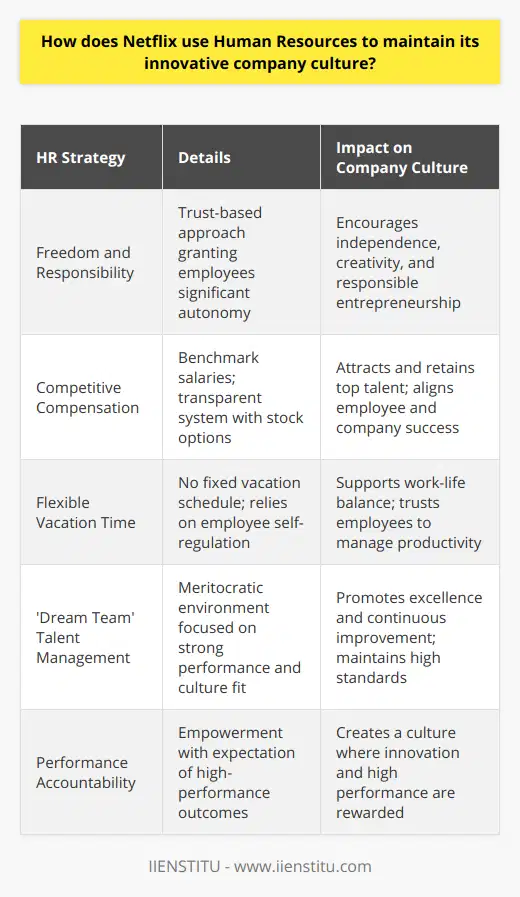
What role does transparency play in Netflix's HR policies and practices?
Role of Transparency in HR Policies
Transparency plays a critical role in Netflix's human resource (HR) policies and practices. By adopting transparency, Netflix has not only created a culture of openness and trust among its employees but also ensured compliance with legal and ethical standards.
Trust and Open Communication
One of the primary goals of Netflix's transparent HR policies is to foster trust between employees and the organization. Netflix achieves this through open communication with employees about company updates, wage policies, and personal progress assessments. Such open conversations establish a clear understanding of the company's operations, expectations, and employees' performance, enabling a trusting and supportive work environment.
Employee Retention and Engagement
Transparent HR practices also contribute to employee retention and engagement. Netflix’s approach to sharing information and involving employees in decision-making enables them to feel valued and invested within the organization. Furthermore, transparency in performance evaluations and compensation packages allows employees to understand their roles and align their goals with the organization’s objectives. Ultimately, this level of transparency contributes to increased employee satisfaction and loyalty, thereby reducing turnover rates.
Compliance with Legal and Ethical Standards
Transparency in Netflix's HR policies ensures compliance with legal and ethical standards. By openly discussing policies and practices, Netflix avoids potential conflicts with labor laws and regulations. Additionally, transparency regarding diversity and inclusion initiatives exhibits the company’s commitment to social responsibility, enabling Netflix to build and maintain a positive public image.
Fair and Competitive Compensation
Netflix's transparent HR practices also play a role in ensuring fair and competitive compensation for its employees. The company openly discusses salaries and other benefits, allowing employees to understand the rationale behind their wage structure. This open practice fosters a sense of fairness and equality in the workplace, motivating employees to perform to the best of their abilities.
In conclusion, transparency in Netflix's HR policies and practices promotes trust, employee retention, compliance with legal and ethical standards, and a fair and competitive compensation structure. By embracing transparency, Netflix has successfully cultivated a supportive, accountable, and engaging work environment, contributing to its status as a leading global media brand.
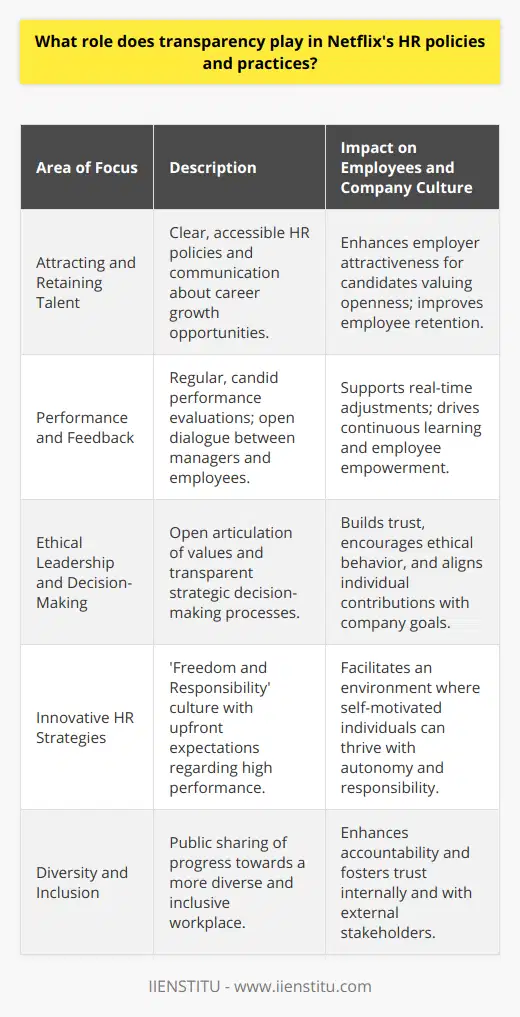
How does Netflix's unique approach to employee retention and talent management differ from traditional HR methods?
Unique Approach to Employee Retention
Netflix's approach to employee retention and talent management significantly deviates from traditional human resources (HR) methods. Traditional HR often focuses on measuring employee performance by following strict processes, such as annual performance reviews, structured promotions, and standardized compensation packages. In contrast, Netflix adopts a more innovative strategy, prioritizing employees' skills and contributions, rather than adhering to standardized systems.
Emphasis on High Performance
At the core of Netflix's talent management strategy lies the company's commitment to maintaining a high-performance culture. Unlike conventional HR approaches that seek to accommodate a diverse range of employee performance levels, Netflix sets the bar high, retaining only top performers. Employees unable to demonstrate exceptional performance may face a transparent and respectful exit from the organization, ensuring that the workforce remains agile and competitive.
Generous Compensation and Benefits
Another differentiating factor is Netflix's approach to compensation and benefits. Rather than following a fixed salary structure with predetermined annual increments, Netflix offers its employees top-of-the-market compensation packages commensurate with their skills and expertise. This approach enables the company to attract and retain the best talent in the industry, without imposing restrictive hierarchies and promotion ladders.
Unrestricted Vacation Policy
A notable aspect of Netflix's employee retention strategy is the implementation of an unrestricted vacation policy. Unlike traditional HR methods that dictate the number of annual leave days an employee is entitled to, Netflix entrusts its employees with the flexibility to choose their vacation days based on individual needs and work obligations. This freedom not only promotes employee satisfaction but also fosters a results-driven culture that values output over attendance.
Emphasis on Organizational Values
Finally, Netflix's approach to talent management sets it apart from traditional HR methods by actively emphasizing the company's core organizational values. Employees are encouraged to embody these values, such as 'freedom and responsibility,' 'communication,' and 'integrity,' in their day-to-day interactions and decision-making processes. By fostering an environment that emphasizes shared values, Netflix cultivates a cohesive and motivated workforce capable of driving the company towards sustained success.
In conclusion, Netflix's unique approach to employee retention and talent management challenges the conventional wisdom of traditional HR methods. By prioritizing high performance, offering generous compensation packages, implementing unrestricted vacation policies, and emphasizing organizational values, Netflix has crafted an innovative talent management strategy that attracts, retains, and nurtures top-tier talent in a highly competitive industry sector.
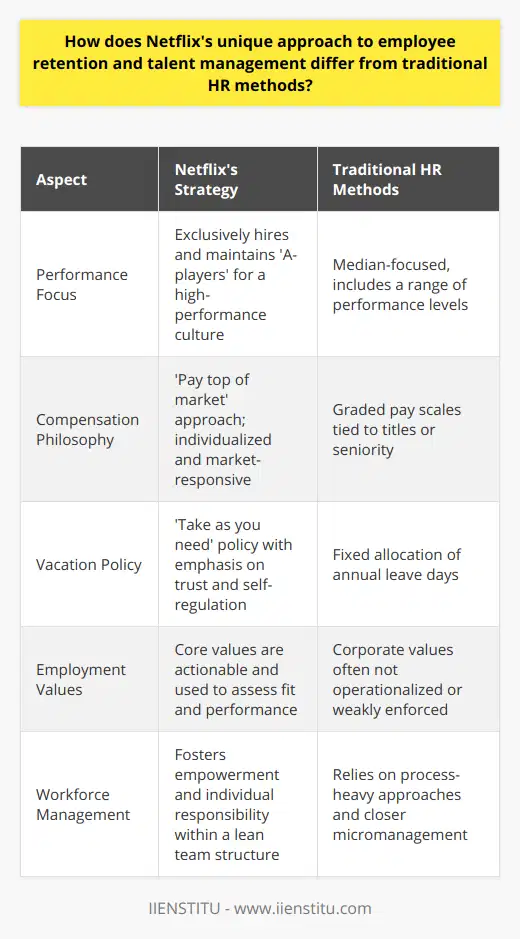
How does Netflix implement continuous feedback in its human resources strategy?
Continuous Feedback in Human Resources Strategy
Defining Continuous Feedback
Netflix, as a leading streaming platform, leverages a unique and adaptive human resources (HR) strategy called continuous feedback. This approach focuses on providing constant, honest, and open communication among employees and management, as opposed to traditional yearly performance appraisals. Adopting this method has allowed Netflix to foster a high-performance culture and stimulate continuous improvement.
Implementation of Continuous Feedback
In practice, Netflix's continuous feedback stems from ongoing conversations among colleagues that encourage individual growth and development. These discussions occur in various forms, such as one-on-one meetings, team gatherings, or informal chats. The main aim is to foster a growth mindset by regularly addressing individual strengths and areas for improvement.
Radical Candor Framework
Netflix's continuous feedback approach is built on the 'Radical Candor' framework, which promotes direct, constructive, and empathetic feedback. This framework aids in nurturing a culture where managers consistently engage in open and honest communication with their team members. Consequently, it gives employees the necessary insights and support to maximize their potential and help drive the company's success.
360-Degree Feedback Model
Furthermore, Netflix employs a 360-degree feedback model that amplifies the continuous feedback system. This model facilitates the exchange of feedback among peers, subordinates, and supervisors, enabling employees to gain a comprehensive understanding of their performance from various perspectives. By adopting this approach, Netflix supports the personal and professional growth of its workforce.
Integrating Continuous Feedback with HR Practices
Netflix's continuous feedback strategy is deeply ingrained in its HR practices, particularly in performance evaluations, promotions, and compensation decisions. By consistently gathering and analyzing feedback data, the company can make well-informed decisions on allocating resources, recognizing high-performing employees, and addressing underperformance, thereby contributing to its overall success.
Conclusion
In summary, Netflix's implementation of continuous feedback reflects its commitment to cultivating a high-performance work culture. By embracing the Radical Candor framework and incorporating the 360-degree feedback model, Netflix nurtures a continuous development mindset among its employees. Consequently, this strategy has proven instrumental in fostering employee engagement, driving innovation, and maintaining its competitive edge in the industry.
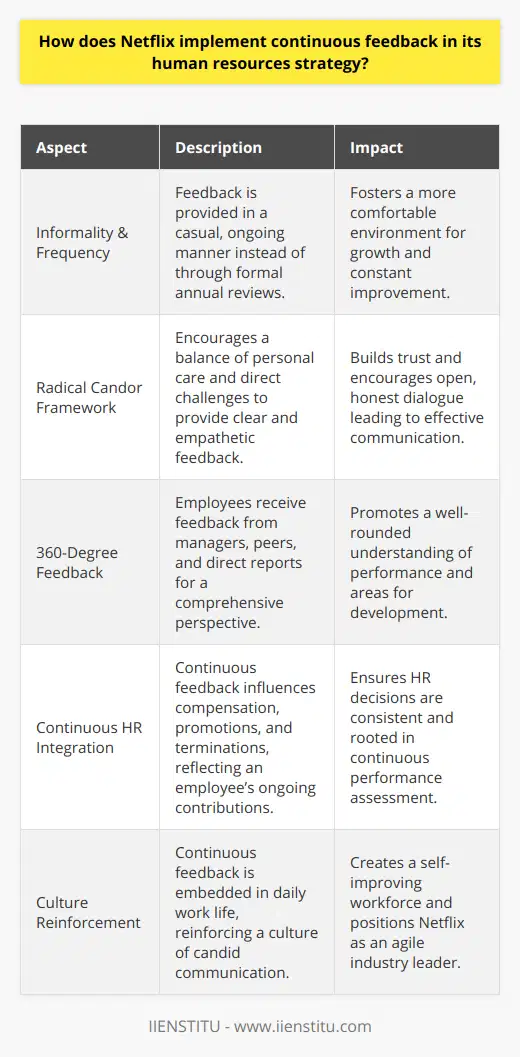
To what extent does Netflix utilize data-driven decision-making in its HR practices?
Extent of Data-Driven Decision-Making in HR
Netflix notably utilizes data-driven decision-making in its HR practices, which essentially builds the foundation of its robust and innovative workforce. Through a comprehensive examination of the company's public records and management style, three key areas in its HR practices that involve data-driven decision-making are evident: talent acquisition, employee development, and performance management.
Talent Acquisition Strategies
In the talent acquisition process, Netflix relies on data analytics to identify potential candidates and predict their suitability for the company. By analyzing demographic data, skill sets, expertise, and experience levels, Netflix's HR effectively determines which individuals may thrive in their organizational culture. This streamlined approach ensures that they recruit the right talent, thereby reducing employee turnover and boosting workforce productivity.
Employee Development Initiatives
On employee development, Netflix utilizes data to analyze employee skills and gaps, which helps in the creation of targeted training programs. By tracking internal metrics such as employee satisfaction, collaboration, and individual performance, HR teams pinpoint areas of improvement and design initiatives to bolster employee growth. Consequently, data-driven employee development initiatives contribute to fostering an empowering environment that encourages continuous learning, personal growth, and overall job satisfaction among Netflix employees.
Performance Management Tactics
Regarding performance management, Netflix employs data-driven strategies to reward high achievers and determine suitable compensation packages. By evaluating factors such as individual performance metrics, market salary trends, and employee feedback, the company ensures that remuneration and promotion decisions remain transparent, fair, and objective. This data-driven approach towards performance management highlights Netflix's commitment to a culture of accountability, meritocracy, and excellence.
In conclusion, Netflix showcases a substantial reliance on data-driven decision-making within its HR practices. Adopting data analytics in talent acquisition, employee development, and performance management provides Netflix with accurate insights to build, nurture, and maintain a high-performing workforce. Through these informed decisions, Netflix's HR effectively drives its organizational success and its ability to remain as a leader within its industry.
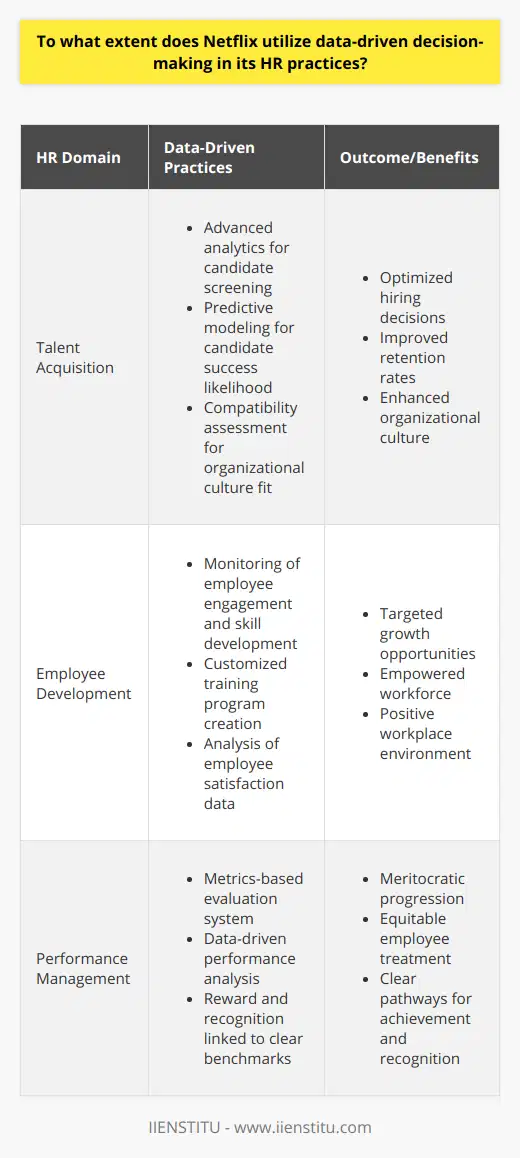
In what ways do Netflix's HR policies and principles contribute to fostering a high-performance work environment?
Impact of HR Policies and Principles
Netflix's HR policies, such as the famous 'freedom and responsibility' principle, empower employees to exercise autonomy in their work. This cultural value encourages innovation, as workers can take risks and experiment with new ideas without seeking excessive approvals. The increased engagement from employees leads to enhanced performance and a competitive advantage for the organization.
Cultural Emphasis on Excellence
Netflix places a strong emphasis on hiring top performers and maintaining a high-performance work environment. By rewarding excellence and deprioritizing factors like tenure, the company motivates its workforce to constantly strive for improvement. This approach promotes a creative and dynamic atmosphere, where employees feel challenged and inspired to achieve their best.
Transparency and Feedback
The company advocates for open and honest communication, resulting in a transparent work culture. Employees are frequently given constructive feedback on their performance, enabling them to identify areas for growth and align their efforts with company goals. This constant feedback loop not only boosts individual performance but also nurtures a culture that values learning and development.
Flexible Work Arrangements
Netflix's flexible work arrangements allow employees to maintain a healthy work-life balance, which can improve overall job satisfaction and drive higher performance levels. By offering unlimited vacation time and the ability to work remotely, the company demonstrates trust in its employees and respects their personal time. This flexibility can lead to increased motivation and loyalty, ultimately contributing to a high-performance work environment.
Inclusion and Diversity
Commitment to fostering an inclusive and diverse workplace bolsters Netflix's high-performance culture. Diverse teams can generate a broader range of ideas and strategies, leading to more innovative solutions. Employees who feel included and valued in their workplace are more likely to be engaged and committed, driving business performance and success.
In conclusion, Netflix's HR policies and principles have a significant impact on fostering a high-performance work environment. By giving employees autonomy, emphasizing excellence, promoting transparency, offering flexibility, and nurturing a diverse and inclusive culture, Netflix cultivates an environment in which its employees can thrive and contribute to the company's success.
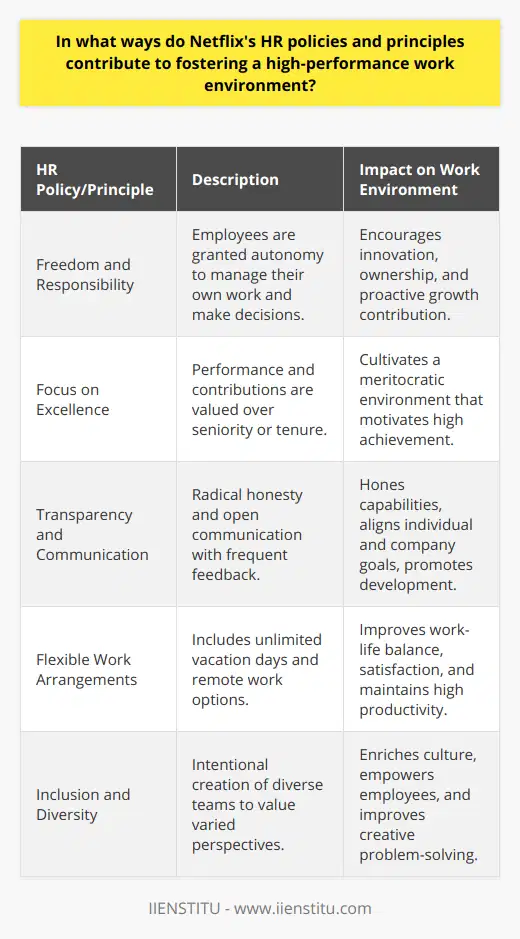
What is Netflix's approach to HR?
**Netflix's Unique HR Approach**
Netflix's approach to human resources (HR) is primarily based on fostering a high-performance culture. The company's HR strategy focuses on recruiting top talent, maintaining a competitive compensation structure, and ensuring a strong alignment between organizational and employee goals.
**Recruiting Top Talent**
One of the key aspects of Netflix's HR approach is to hire only high-performing individuals who are dedicated to the company's mission and values. By doing so, Netflix ensures that its employees are invested in its success and contribute to the growth and development of the organization. The company believes in employing fewer highly talented individuals who can add greater value than a more significant number of average employees. This approach ensures that each team member has a significant impact on the organization's overall performance.
**Competitive Compensation Structure**
Netflix recognizes the importance of offering a competitive compensation package to attract and retain high-performing employees. As a result, the company provides generous salaries, stock options, and a range of benefits, including unlimited vacation time. This approach not only helps to attract top talent to Netflix but also fosters employee loyalty, commitment, and motivation.
**Alignment of Goals**
Netflix's HR approach emphasizes the alignment of organizational goals with employee aims. It achieves this through regular performance evaluations, which encourage employees to hold themselves accountable for their performance and the impact they have on the company. Moreover, the HR team consistently communicates the company's core values and expectations, and employees are encouraged to embody these values in their everyday work.
**Freedom and Responsibility**
Netflix's HR approach also promotes a culture of freedom and responsibility, empowering employees to make independent decisions and take ownership of their work. Such a culture fosters innovation, creativity, and high employee engagement, as employees are granted the trust and autonomy to excel in their respective roles.
**Emphasis on Employee Success**
Lastly, Netflix's HR strategy places significant importance on supporting employees' professional growth and development. It believes that investing in employee success is crucial for the long-term success of the organization. Consequently, Netflix offers a range of training and development opportunities, mentorship programs, and other resources aimed at enhancing employee skills, knowledge, and expertise.
In conclusion, Netflix's unique approach to HR is built on the pillars of hiring top talent, providing competitive compensation, and fostering a culture of performance, freedom, responsibility, and growth. This strategy has contributed significantly to the company's success and has set a benchmark for companies in various industries worldwide.
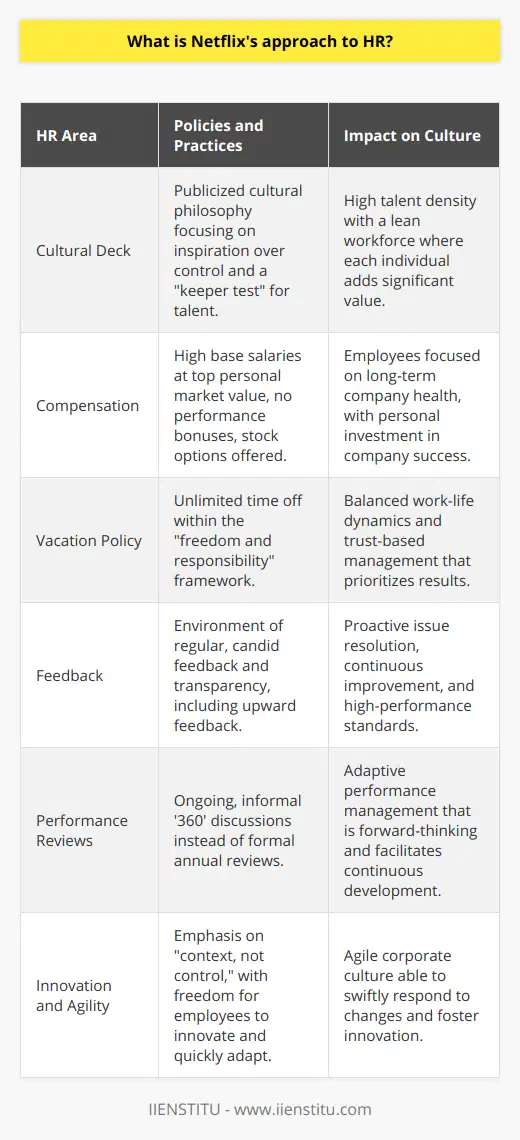
How does the management approach of Netflix influence its human resources practices?
Management Approach at Netflix
The management approach of Netflix significantly influences its human resources practices through its unique corporate culture and focus on employee empowerment. As a disruptive force in the entertainment industry, Netflix's management style emphasizes agility and innovation, with its primary aim to deliver an exceptional user experience.
Impact on Recruitment and Retention
Consequently, Netflix's human resources practices focus on attracting and retaining top talent who can contribute to the company's ongoing success. The company's famed 'Freedom and Responsibility' employment culture emphasizes the hiring of high-performing, self-motivated individuals who thrive in an environment where they are trusted to deliver without close supervision. By offering competitive salaries and benefits, Netflix is able to recruit the best candidates in the field.
Employee Evaluation and Compensation
Netflix's management approach favors ongoing performance assessments over rigid, annual evaluations, promoting a continuous growth mindset among employees. With its agile and flexible working environment, employee performance is celebrated and rewarded, ensuring strong motivation to maintain exceptional output. Moreover, the company demonstrates its commitment to retaining its workforce through high compensation and severance packages, recognizing the value of employee contributions.
Focus on Transparency and Communication
Emphasizing open and transparent communication, Netflix's management actively engages with employees via weekly meetings and direct feedback channels. The company cultivates a constructive and collaborative environment, where employees are encouraged to voice their concerns, suggestions, and ideas. This continuous exchange of information fosters a sense of trust and shared ownership among employees, further strengthening Netflix's human resources practices.
Work-Life Balance and Employee Perks
Netflix also acknowledges the importance of work-life balance and personal growth opportunities for employees. By offering unlimited paid time-off and advocating for managerial support regarding employee career goals, Netflix bolsters its commitment to fostering a healthy and sustainable work environment. This focus on employee well-being further solidifies its reputation as an attractive and supportive employer in the industry.
In conclusion, Netflix's management approach plays a pivotal role in shaping its human resources practices. By fostering a culture of innovation, transparency, and employee empowerment, Netflix successfully attracts and retains top talent, ensuring its continued success in the competitive entertainment industry.
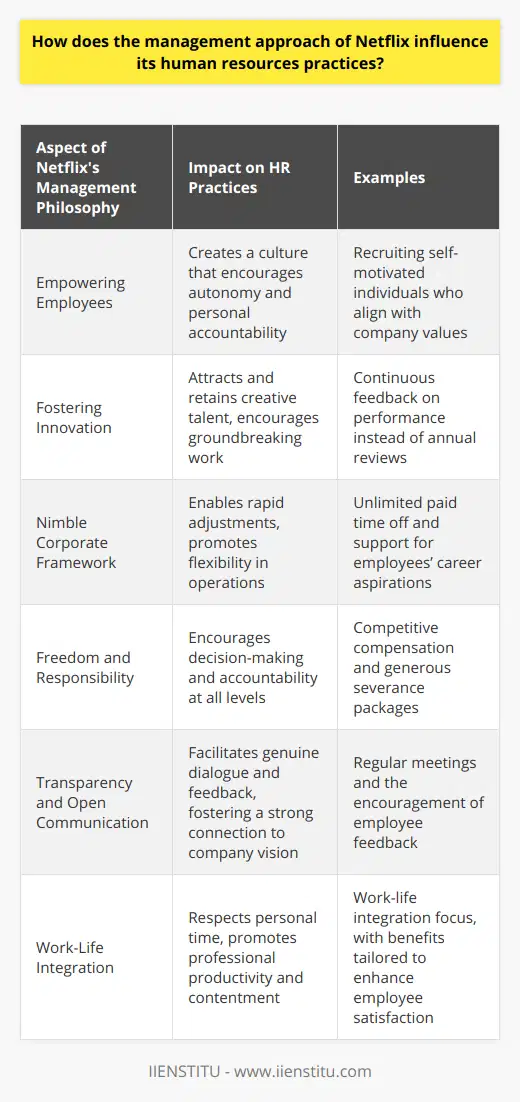
Can you provide a summary of how Netflix reinvented their HR strategies and policies?
Organizational Restructuring
Netflix underwent a significant transformation in the way it managed its human resources, adapting to new market realities and shifting its business model. A core aspect of this reinvention was the company's shift from a DVD rental service to a streaming content provider, which required substantial changes in HR strategies and policies.
Performance Evaluation
One of the key changes Netflix implemented was in its performance evaluation process. The company now practices a candid feedback culture where employees are encouraged to openly discuss performance with colleagues, managers, and even CEO Reed Hastings. This has been made possible through an innovative management approach called “Keeper Test,” which helps determine whether an employee should stay or leave based on their contribution to the team.
Developing Employee Talent
Netflix also began investing heavily in employee development to ensure a continuous supply of skilled talent. Instead of focusing on formalized training programs, Netflix implemented an on-the-job learning approach. This allows employees to collaborate with one another, learn from each other's expertise, and subsequently grow within their roles. In addition, the company organizes frequent workshops, seminars, and conferences to help employees stay updated on industry trends and develop new skills.
Competitive Compensation
To attract and retain top talent, Netflix shifted its compensation strategy, ensuring that employees receive competitive salaries and benefits commensurate to their market value. The company maintains a strong focus on rewarding top performers and discouraging mediocre performances, making use of stock options, and bonuses to incentivize employees and recognizing their contributions.
Emphasis on Cultural Fit
One of the most significant changes in Netflix's HR policy was the increased focus on cultural fit while hiring. The company built a culture based on nine core values, which include curating excellence, embracing candor, and creativity. Prospective candidates are meticulously assessed against these values, ensuring that new hires seamlessly integrate into the existing workforce and support the company's growth trajectory.
Flexible Work Environment
Lastly, Netflix instituted a flexible work environment, which promotes work-life balance, reduces stress, and fosters productivity. The company implemented the controversial “no-vacation policy,” which allows employees to take unlimited vacation days, provided they meet their performance goals and deadlines. However, trust and accountability play a critical role in ensuring such policies work for the benefit of both employees and the company.
In conclusion, Netflix's reinvention of its HR strategies and policies has been instrumental in its success and growth. By focusing on performance evaluations, employee development, competitive compensation, cultural fit, and providing a flexible work environment, the company has successfully created a highly motivated workforce that contributes to its continued success in a rapidly changing industry.
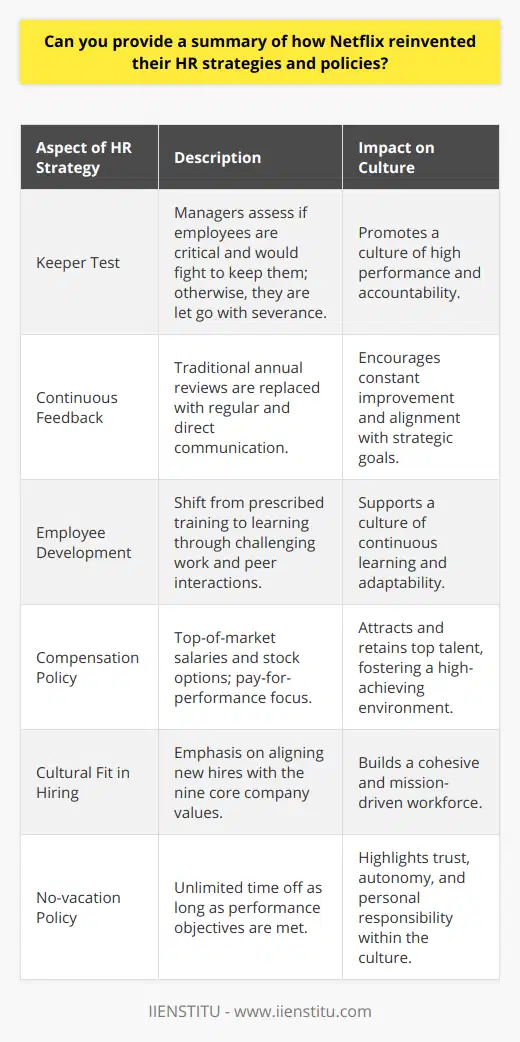
How does Netflix use intrinsic motivation to support its HR practices?
Intrinsic Motivation in Netflix's HR Practices
Understanding Intrinsic Motivation
Intrinsic motivation refers to an individual's internal drive to engage in a task or activity for the inherent satisfaction or personal fulfillment derived from it, rather than for any external rewards or incentives. Netflix, a leading entertainment service provider, effectively integrates intrinsic motivation into its human resources (HR) practices to enhance employee engagement, satisfaction, and productivity.
Creating a Learning Environment
One of the ways Netflix fosters intrinsic motivation among its employees is by cultivating a culture of continuous learning and development. This approach allows employees to grow professionally, acquire new skills, and broaden their horizons, which in turn, increases their internal motivation to perform better in their roles. Netflix provides employees with access to training courses, workshops, and seminars, encouraging them to constantly improve and seek new challenges within the company.
Autonomy and Decision-Making
Netflix also recognizes the importance of autonomy in driving intrinsic motivation. The company believes in empowering its employees to make decisions independently and take ownership of their projects. By giving employees the freedom and trust to experiment with ideas, Netflix promotes a sense of ownership that strengthens their intrinsic motivation to succeed. This creative and autonomous environment enables employees to take pride in their work and derive satisfaction from accomplishing their tasks.
Emphasizing Purpose and Impact
To further enhance intrinsic motivation, Netflix consistently underscores the purpose and impact of the work done by its employees. By highlighting the broader vision and goals of the organization, Netflix helps employees understand how their individual contributions directly influence the company's success. This connection to a larger purpose not only keeps employees motivated to perform their tasks, but also generates a sense of pride and fulfillment in their work.
Fostering Collaboration and Support
Finally, Netflix believes in the power of collaboration and support among colleagues to strengthen intrinsic motivation. The company emphasizes a culture that values teamwork, open communication, and interpersonal relationships. Employees are encouraged to share ideas, learn from one another, and provide feedback, creating a dynamic and cohesive work environment. This supportive atmosphere encourages employees to derive internal satisfaction from contributing to the team's success, thereby boosting their intrinsic motivation.
In conclusion, Netflix effectively utilizes intrinsic motivation to support its HR practices by creating a learning environment, fostering autonomy, emphasizing purpose and impact, and encouraging collaboration and support. These strategies not only enhance the engagement and satisfaction of employees, but also contribute to the overall success and growth of the organization.
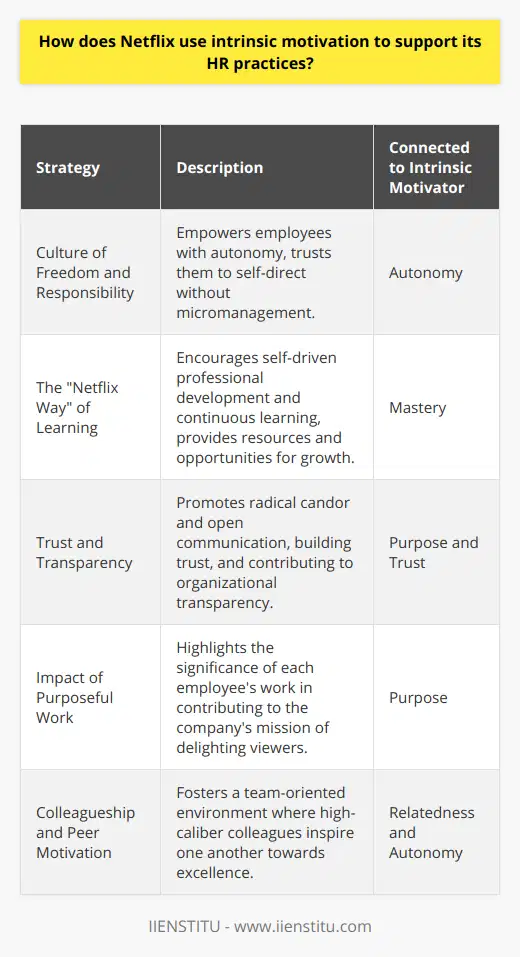
How Netflix reinvented HR case study analysis?
Introducing Innovative HR Practices
Netflix, a leading global streaming platform, has been successful in reinventing and revolutionizing Human Resource (HR) practices. By analyzing this case study, one can observe the successful implementation of novel HR strategies that significantly improved the company's overall performance.
Performance-Based Culture
Netflix's foremost innovative HR practice is the strong emphasis on the performance-based culture. Employees are evaluated based on their impact and contribution to the organization's success. This approach eliminates the need for complex performance metrics and focuses on objective accomplishments, fostering a results-driven environment.
No Formal Leave Policy
Another noteworthy HR policy in the case study is the absence of a formal leave policy. Employees have the flexibility to take time off as per their needs without adhering to a rigid leave structure. This emphasizes the company's trust in its employees and supports work-life balance.
Talent Recruitment and Retention
Netflix's approach to talent recruitment and retention is also exceptional. The company identifies top talent by seeking employees who demonstrate 'stunning' performances, and compensates them with generous salaries, well above the market average. This strategy ensures the attraction and retention of a highly skilled workforce.
Constant Organizational Learning
The company also takes a proactive approach to organizational learning, ensuring that employees are always up-to-date with the latest industry trends and technologies. By empowering employees to continuously learn and grow, Netflix cultivates a thriving innovation ecosystem necessary for its sustained success.
Transparent Communication
Transparency is a core value ingrained in Netflix's HR practices. Open and honest communication is encouraged at all levels of the organization, creating a culture of trust and collaboration. This enables employees to make informed decisions and actively engage in driving the company's growth.
360-Degree Feedback
To foster continuous improvement and personal development, Netflix has implemented the 360-degree feedback system. This holistic appraisal method collects data from a variety of sources, including colleagues, managers, subordinates, and even self-assessment, enabling employees to gain valuable insight and enhance their performance.
In conclusion, the Netflix HR case study reveals the profound impact of innovative HR practices on an organization's success. By aligning performance-based culture, flexible leave policies, effective talent recruitment, constant learning, transparent communication, and 360-degree feedback systems, Netflix has developed a resilient, high-performance organization that continues to excel in the global streaming market.
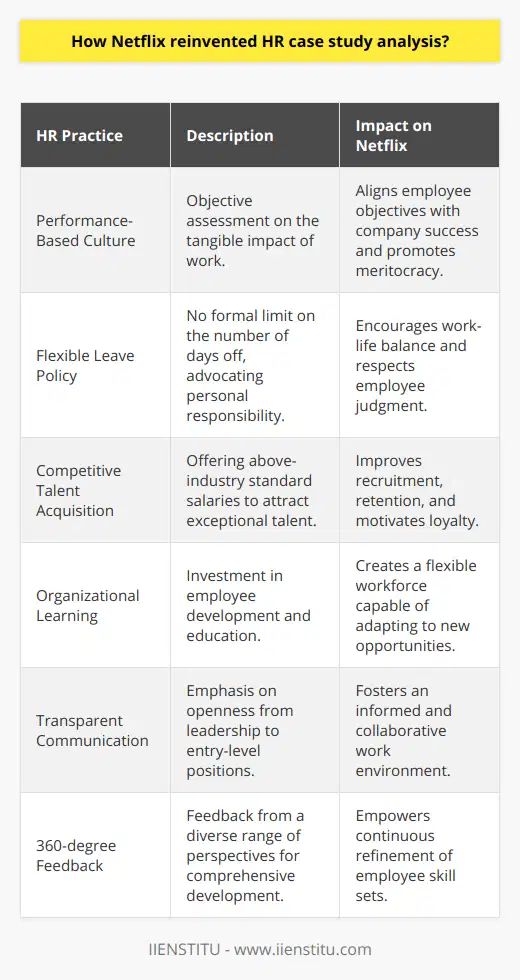
In what ways have Netflix's HR policies and practices contributed to its success and competitive advantage in the industry?
Work Culture and Flexibility
Netflix's success and competitive advantage in the industry can be attributed to its innovative and employee-centric human resources policies and practices. One key aspect is the company's work culture that promotes flexibility and autonomy, empowering employees to make decisions and take ownership of their work. This approach fosters creativity and innovation, which in turn allows Netflix to stay ahead in the rapidly changing media landscape.
Unique Recruitment Strategy
Another significant contributor to Netflix's success is its unique recruitment strategy, which focuses on hiring 'stunning colleagues' - individuals who not only possess the required skills but are also highly motivated and capable of making significant contributions to the company's success. By striving to ensure that every employee is a top performer, Netflix avoids complacency and continues to maintain its competitive edge.
Generous Compensation and Benefits
Netflix's competitive advantage in the industry is also supported by its generous compensation and benefits policies, which help the company attract and retain top talent. The company offers industry-leading salaries and a comprehensive benefits package, including flexible parental leave and unlimited vacation time. Additionally, it adopts a pay-for-performance approach, ensuring that employee rewards are closely aligned with their individual contributions and the company's overall growth.
Transparent Communication and Feedback
The company's commitment to open and transparent communication also plays a significant role in its success. Netflix encourages employees to provide honest and constructive feedback to one other, fostering a culture of continuous learning and improvement. This approach enables employees to excel in their roles while contributing to the company's drive for excellence and innovation.
Continuous Learning and Development
Investing in employees' growth and development is yet another aspect of Netflix's HR policies, which contributes to its success and competitive advantage. The company offers various learning opportunities, including workshops, conferences, and online courses, to support employees in enhancing their skills and staying up-to-date with industry trends. By prioritizing employee development, Netflix ensures that its workforce remains highly skilled and adaptable to the dynamic media landscape.
In conclusion, Netflix's success can be attributed to its well-rounded human resources policies and practices that center on creating a conducive work environment, attracting top talent, incentivizing performance, fostering open communication, and investing in employee development. These elements collectively enhance the performance and creativity of its employees and contribute to the company's competitive advantage in the industry.
